SHIFT HAPPENS | SEASON 1 • EPISODE 6
Angie Weinberger on Inclusive Leadership and Intercultural Competence
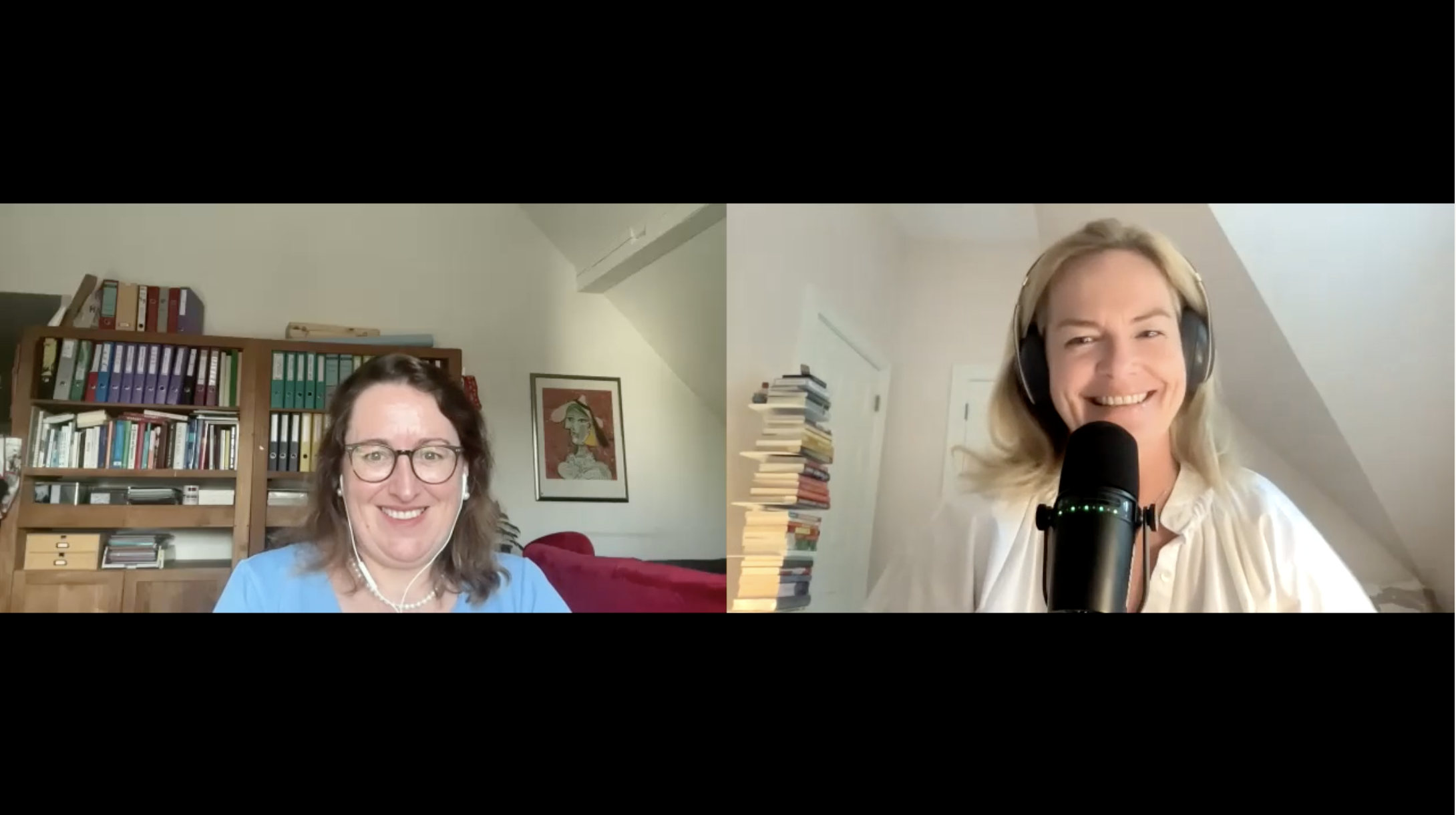
SHIFT HAPPENS is a Global Take on Women’s Turning Points and Pivotal Moments
In this episode, Angie Weinberger shares her wisdom on inclusive leadership and intercultural competence. Her book, The Global Rockstar Album – 21 Verses to Find Your Tact as an Inclusive Leader, was published in October 2023, and is geared towards leaders that are going through challenging times in their personal and professional lives, addressing vulnerability, privilege, and imperfection. Tune in to hear how a shift in Angie’s personal life led her to slow down and experience a burst of creativity — and write a book that helps others discover that “rockstar feeling.”
Listen
About Our Guest
Angie Weinberger is on a Mission to bring the “Human Touch” back into Global Mobility. As the Global Mobility Coach (@GlobalMobilityCoach), she combines executive coaching, her expertise, and workshop facilitation skills into programs for Global People. She has lived and worked in Germany, Switzerland, the UK, India, and Australia.
After graduating in International Business Studies from the University of Paderborn in 1997, Angie worked in International Human Resources. She specialized in Human Resources and Global Mobility during her corporate career at a large global bank and was then hired by one of the Big Four Professional Services Firms in Germany to lead Global Mobility. She moved to Switzerland with the same company in 2009 to lead Global Mobility in Switzerland. Angie Weinberger also lectures at universities and consults companies on Global Mobility Transformation.
She is a certified Executive Coach (with over 1000 coaching hours), group workshop facilitator, intercultural trainer, and systemic consultant. As a certified Intercultural Development Inventory® (IDI) and Individual Cultural Blueprint Indicator (ICBI) Qualified Administrator, she runs intercultural competence assessments and teaches how to develop intercultural and diversity competence.
Angie Weinberger wrote two workbooks, The Global Mobility Workbook, Third Edition (2019), and The Global Career Workbook (2016).
She is involved in developing a web application for online coaching, RockMeApp. Currently, she’s deepening her understanding of depth psychology by studying a three-year course on Transactional Analysis at the Eric Berne Institute, Zurich. Her working languages are English and German. She speaks French and Spanish on a conversational level, understands Swiss German, and has studied Arabic. When Angie Weinberger is not working, she enjoys hiking anywhere, watching movies, and overindulging in the spicy food her partner cooks.
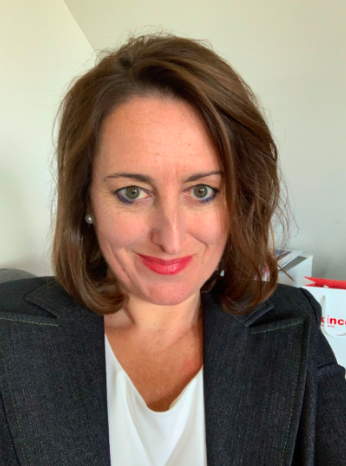
About Your Host
Claudia Mahler is a creative activist, with more than a decade of experience curating meaningful conversations for women in business, art and education in Europe and the United States.
She designs events for women’s empowerment that emphasize organic connection and conversation to complement existing professional development training in a variety of work environments.
She has 20+ years of experience in communications and PR in Europe and the East Coast of the United States.
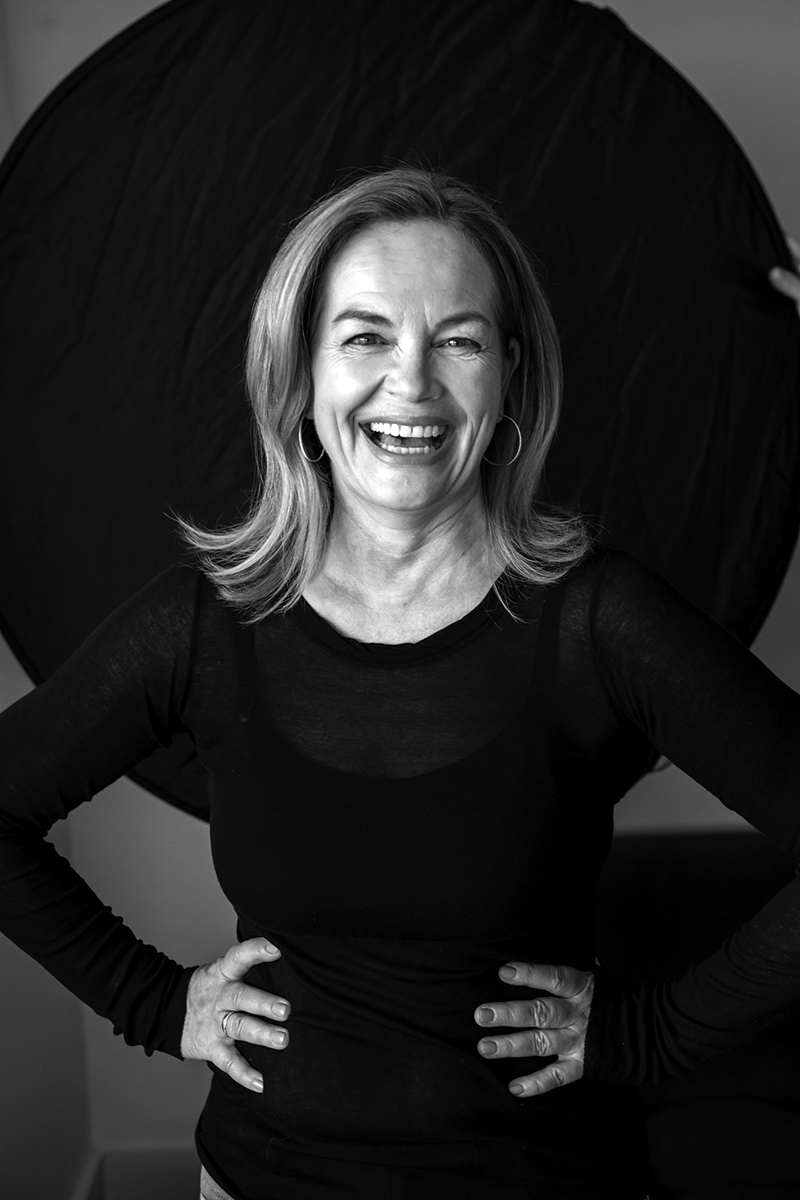
Transcript
Angie Weinberger on Inclusive Leadership and Intercultural Competence
Claudia: Hello, and welcome to Shift Happens. My name is Claudia Mahler and I am curious about how women made it through turning points in their lives and how they reflect back on them.
Too often, women just get on with it. The everyday, the duties, the expectations—too often, life-altering events are being swept under the rug as life must go on.
With Shift Happens, I want to create a space for women to pause for a moment and to share, to listen, and to feel heard. A space where we connect and talk about life and its pivotal moments—about the highs and lows, the challenges and the joys, about what has been gained and about how enriching change can be. Some things we hear are heavy, some are funny. They all put me in awe as they are honest and raw testimonies of life.
This podcast is a little window into the world. I invited women from all walks of life and various counties, countries and continents. I am in conversation with authors, business owners, artists, life coaches and change makers. All these women have their individual life story and much wisdom to share.
When I interviewed my guest for today’s episode, Angela Weinberger, it was actually before the launch of her fourth book last September. By now, The Global Rockstar Album – 21 Verses to Find Your Tact as an Inclusive Leader, has been published together with The Global Rockstar app and both have already received applauding reviews.
Angie Weinberger, a global mobility expert living and working in Zurich, is a natural in building bridges between cultures, within countries and continents, within companies and organizations, within her own family and business. She is a force of willpower, compassion, and creativity and will share with us which turning point led her to unleash her creative power, and which new skills she then had to cultivate and implement to get there.
So, today I’m here in conversation with Angela Weinberger, joining from Zurich. Angie and I, we met a very very long time ago, already on a mission to bring women together, but she then embarked—about ten years ago, right?—on your own business in global mobility as a coach of global mobility, and you really built quite a big business.
You’ve written two books, your third one is coming out now, which we’re going to hear about later a little bit. And in your bio, it says, “Angie Weinberger is on a mission to bring back the human touch into global mobility.” Yay, so much needed on all fronts.
Before we dig a little deeper, I wanted to ask you a few prompts to break the ice.
Flat or sparkling?
Angie: Flat.
Claudia: Dogs or cats?
Angie: Oh God, I’m ambivalent, but I think right now dogs.
Claudia: Apples or oranges?
Angie: Apples.
Claudia: On your phone, which app do you use most often?
Angie: My calendar.
Claudia: You’re alone on a deserted island. You can only bring one thing. What is it?
Angie: I’m thinking my partner, because that way we’re always going to have some good food.
Claudia: Ah, clever. You need to survive.
Now we can dive right into your story. In Shift Happens, I’m in conversation with women to share and talk about pivotal moments and turning points. Life has been long for us—luckily—already, so of course there’s a lot, but maybe you can share with us the pivotal moment that stands out for you.
Angie: You know, I think in my life there have probably been several pivotal moments, but I wanted to tell you a bit about my last moment of recognition that I needed to change something.
This happened last year in September. My 100-year-old grandma died. She had a long life, so we were sort of expecting her to die at some stage. But when it happened, I realized that I had a hard time letting go of work and just being with my family and with my feelings for a week or two. I felt bad about leaving a project and not being there for my clients. It took me about two or three weeks to finally understand that that is not healthy.
That is not a healthy way of living. At this point in my life, I thought, if something like this happens, your family should be a priority for you. I decided that I needed to change a few things in my business, and also how I lead my life.
Claudia: Wow. A hundred years. Yeah. And when had you seen her last?
Angie: That’s about a year ago. It was in August at the end of the summer break. One of my last memories of her is me and her sitting on her bed and I’m feeding her. It was a beautiful moment. We have always been, I would say, very close by relationship, but not physically. Most of my life, I haven’t been close to her physically. The last few years of her life, I feel like I was able to catch up on seeing her in-person.
Claudia: So, you said that this really was an important moment for you to rethink and shift. How do you think it has impacted you in your personal and professional life moving on from last August?
Angie: You mentioned that I have my own business. My business is over a decade old now, and I feel like I’ve been keeping myself very busy with project work, coaching, training, running an academy, writing books… so always, you know, like at the edge. I feel that past a certain age—I turned 50 last year, and I think that is also like a life changing age…
I wanted to embrace my creative side, spend more time also with loved ones, but also spend less time doing busy work, basically. This is something that works quite well for me now. It took me a while to implement this, and sometimes, I feel this need to go back into the red race. I feel bad about not being in the busy hustle anymore, but I also noticed that it has led to a creativity explosion and really, really good ideas, deeper conversations with my clients, better conversations with people I work with, with partners, with friends. It was a necessary shift to get further.
Claudia: Difficult, of course, but rewarding.
So the title of your book, The Global Rockstar Album, I love it. What led you to this energetic title and content, I believe?
Angie: I think it was always about helping others, you know, getting out of their shell. Maybe this is also something that has helped me personally for a while.
You know, when you think of a rock star, it’s somebody who’s on a stage. Usually there’s a little bit of a negative reputation, you know, partying, drinking, all of these associations that we have with rock stars. But I also have a subtitle, and the subtitle is 21 Verses to Find your Tact as an Inclusive Leader. We’re very much using music—and the allegories and the structure of music—in the book.
It’s written like a song, basically, the book. We’re using that idea of a rock band playing together for the team that you might have as a global leader. And what you need to do to get a more inclusive team together.
We’re always coming back to the topic of music, and I think that probably has to do a lot with my childhood. I was exposed to a lot of good music as a child. My parents loved rock music. They loved all sorts of… my father had a record collection. I always associate music with good times.
Claudia: Mm-hmm.
Angie: Yeah, so I feel like, you know, I want more people to feel this high level of energy in their life. At their best selves, in their most creative flow, with the best team that they can build, and I think it takes steps to get there. I want everybody to have that rockstar feeling. That’s why the title.
Claudia: We need it. We need it.
I read here that the content of this book is for leaders that are going through challenging times in their personal and professional life. I find that really interesting, because somehow there’s this image of a leader, a leader is a leader… perfect… either always stays calm when needed, or is super active when needed, somehow in the situation for a reason, which is, you know, not perfection, but, you know, pretty forceful.
So I think it’s really interesting and fascinating to address it to leaders that are going through challenges, and I applaud this step because it really brings out a truth that has been so much swept under the carpet—that everybody has challenges, and how do you grapple with that? Like, if you lose someone in your family, but you still need to show up, that’s intense.
Angie: And imagine, you know, when we use the word manager or leader today (First of all, that’s not the same thing for me, two very different things) but when we use the word leader in our context, mostly what comes to mind is a white man, and that kind of superhero that you’re describing. Basically, it’s Superman.
We want to change the story. We want to change that narrative from the leader necessarily being a man. The leader can be a woman. A rock star can be a woman. It can be a woman with brown skin.
The thing is, we’re addressing privilege in the book. White privilege. We’re addressing inclusion as being more pervasive now, as being more necessary now. I think we have these concepts in our head, and they are often in our way. They stop us from opening up the world to, for example, amazing women.
I worked in HR for a long time. I have for a long time tried to work on these topics through coaching, leadership development, etc.. But what we also need to remember is we need to change the story, and have a different story that we talk about overall.
Claudia: Going back to the shift, it is really helpful having gone through this so consciously yourself just recently, to share it with your clients. It’s this authenticity factor too, right? That comes in there.
Angie: Yeah, yeah. I mean, I try not to be too academic in my writing, but I think as a coach, as an executive coach, it is sometimes helpful if your clients can relate to something you’ve gone through, because it gives them more the feeling they’re not alone in this. I have a lot of clients, for example, who have undergone some childhood trauma, and it really helps them when I tell them my story. I think we need to say goodbye to the idea that a leader is somebody where everything has always been “Instagram-perfect.”
I rather think it’s the other way around. It’s probably somebody who has overcome a lot of challenges in their lives and is still running, is still going, and still showing up despite everything that is going on.
Claudia: Yeah, and thankfully, right? I mean, your work is helping to change the narrative. Luckily, there’s an energy right now where we are shedding this and embarking to new role models. I also see that with the younger generation. I mean, they’re just so ahead in their thinking and openness that nobody’s perfect. I think we’ve been raised differently.
You are about to release the book, and you also are teaching at universities, and you wrote that within your coaching you also—that I also was fascinated by—that you teach how to develop intercultural and diversity competence, which is something that is so needed. Going back to the biases, the unconscious and the conscious biases that you refer to. How do you do this? How have your personal shifts influenced this kind of approach?
Angie: Building intercultural competence has been a topic I was fascinated with already as a child. It started very early, when I made my first penpal in Greece. I met a young girl from England, and we started to communicate and write letters to each other in grade four. Basically, it just went on from there.
Building in cultural competence, I always say, is a lifelong process. It doesn’t start and end with a one-day training session. Sometimes people think that, but it’s never that easy. For me, every time I interact with people from other cultural backgrounds, even people in Switzerland, anyone basically, I often also want to look at the intercultural component, and what happens in the interaction, what could be some expectations that are culturally driven. How do I look at things by myself with my German glasses? Why could that sometimes get into my way when I want to lead a global team to move forward?
Obviously, my book launch—for example—is not a one person event, I have a lot of people I work with in different parts of the world so that we can make this happen.
There are five components that are part of the model that we’re using. We will describe the global competency model in this book a bit further, but what is important is that it does not end. It is a lifelong thing. You start somewhere, you have your first intercultural encounter, then you might reflect on this, then you get more knowledge, and then the more knowledge you have, the more you can start to reflect and look at things from a different angle.
Obviously, it helps to go through courses in this area, but I think it really is important that you reflect with somebody who understands these topics better. Becoming an inclusive leader has to do a lot with building that competence, but also, it starts with opening up your mind that maybe your way is not the only great way to do things. Often, if you have been on a success path, this is not the first thing that comes to your mind, because when you’re on a success path, you think, “oh, this is exactly what needs to be done. I know best what needs to be done.” Sometimes you need to learn some methods to open yourself up to gain other people’s input, and to be open to other people’s input.
This is also a process I’m still going through occasionally. I’m trying also to expose myself to other opinions in the book launch process. We’ve done some… for example, we had a tester group and feedback session with the tester group, just to get different perspectives. For example, somebody from India, or somebody from Canada. So that we’re not just thinking and looking at this through, let’s say, more like a Germanic perspective. It’s a long process, I would say.
Claudia: You mentioned the person from India, and I also know that you worked and lived in India for a little bit, right? Has this influenced you? Has this experience… was this also part of a shift in your life in general, to have this exposure?
Angie: Yes, I would say. If I think about some of my, let’s say, “pivotal moments,” “shift moments,” that was definitely one of them. I was around thirty-four at the time, fairly young, but also already quite experienced as an HR professional. I had a good status. I was VP at a German bank and they sent me to India to work on a project.
What I learned there is that it’s not always, “my way or the highway,” and how important it is to build a relationship before you start to work with someone. I also learned that I had this idea in my mind that I would go to India to “help the people.” I’m making some air quotes here because I noticed that the people in India didn’t need my help. We needed their help. But my assumption was, “oh, I’m going there to help them.” So that’s also when I learned most about white privilege, what it means, you know, to grow up with a white background, education… what it means to be in a skin minority, and to be looked at from dusk to dawn.
I had a lot of good experiences there, and many of them changed my outlook on the world a lot.
Claudia: Mm-hmm. Do you have any particular story in mind when you remember that time?
Angie: What do you wanna know? The time when I bought a carpet, because I told the driver I would like to go shopping, and he took me to a carpet store instead of a mall, and I ended up buying a carpet.
[Laughter]
When you think about shifts, and you think about your brain, one of my best examples that I have from India is… I don’t know if you know Bollywood movies, Claudia.
Claudia: A few, yeah.
Angie: Yeah, I used to watch a few before I went to India, and I was always getting very confused about the story because to me, all the women look the same in these movies. I noticed after I was in India for a few months, my perception changed. I suddenly could make out the difference. Suddenly, I recognized the actors and actresses. Now I know all their names too, I know who they are. I can talk Bollywood with an Indian person. I think that was something where I noticed, “oh…”
So the more you get to see, the more your brain adjusts to seeing better. It’s almost like, you know…
Claudia: It’s a sensitivity.
Angie: When you learn to appreciate wine… like when you started to drink wine, there was basically white wine and red wine. And now, you have a palette. The same happens with intercultural interactions. You suddenly learn, you see more… you open up, basically. Then there’s a bit of an overwhelm for a while, because then you suddenly don’t know what’s left and right anymore. Because you feel like, “oh my god, suddenly the universe is open, I don’t really know who I am anymore.” You go through that phase, and after a while, I think you can see how things are happening in relation to you, to your value system, to your belief system, where it comes from, and that’s why I say it’s a longer process.
I think it’s really important that you are exposed to a lot of other cultural backgrounds before you can actually have that experience. I don’t think it’s something you learn at university. My students, my bachelor students, they think they can just learn it from a book. I always want to welcome them, like fifteen years later, I want to talk to them and shake them and say, “So, do you notice a difference now between what you learned in an abstract way to how the world is in reality?”
Claudia: Yeah, yeah, absolutely. Fascinating.
So with all this wisdom, do you have any advice to your younger self and to your older self?
Angie: So my younger self… I think I was a lot more self-confident when I was twenty-two than I am right now, so I would probably tell her to tone it down a little bit. And also to never stop learning, to always challenge yourself to get out of your comfort zone, go one step ahead, even if it’s hard… and then once you are in that mode, to move forward, to grow, make baby steps, that you learn to cut out your inner critic, basically, and the impostor syndrome.
I feel like a lot of women, and I include myself here, we have this constant nagging voice inside of our head, that “this is not good enough.” Somebody will tell us at some stage that everything we do is basically not good enough.
Claudia: And your older self?
Angie: Now that’s a good question. I probably will tell my older self to, you know, watch what you’re eating and make sure that you’re not gaining any more weight.
Claudia: Well, sounds familiar. So, Angie, what energizes you?
Angie: I love to work with clients, be it one-on-one, or in small group settings, or any type of classroom setting. I really love that. That really gives me a lot of energy. I love it when I see the sparkle of the “aha” moment, when the eyes pop because they just had a recognition, or they just had this amazing thought about themselves, and it really moves them forward. This gives me a lot of energy and gets me out of bed in the morning.
I also love to be outside. I love to play with my plants, I love to hike, just be in nature. Obviously, you know, in Switzerland, you jump in the lake occasionally. And being with friends. That also gives me a lot of energy.
Claudia: You talked before about how you really had to take yourself consciously, and calm yourself down, and not always be on the edge. So how do you calm your mind nowadays?
Angie: Well, I meditate every day, and I try to keep some sort of a strict routine… how I work. For example, I stop work at a certain time. I don’t look at my phone after certain hours. I have very clear rituals, and that keeps my mind in check. My mind is always very active, which is great when you want to write, because, you know, things come up. I also have a regular writing routine, I write at least once a week, sometimes more often. I send out a blog post once a week. This keeps me in the flow.
And other than that, you know, as a coach, I obviously have a lot of methods that I have been trained in. Progressive muscle relaxation or active meditation, going for walks can be very helpful for me. I just have my routines.
Also, when people buy the book, I give them a lot of worksheets and templates… one of them is called My Ideal Week Planner. This is something I also do for myself. Most of the things that I give to clients, I also apply to myself. I have a RockMe app, which is accompanying the book, but it’s also something I use for my clients, and I also use it for myself. Weekly practices, practices that I implement in my life… to tick off at the end of the week. These are all things I also do for myself.
Claudia: Oh, so you developed an app that goes with the book. How cool. Is this already available?
Angie: It is available, but it’s not on the app store.
Claudia: Oh, okay.
Angie: It’s only something you get when you buy the book and you request it from us. We’re not selling it through the app store. It’s basically a web application, but you can also download it to your phone.
Claudia: Oh, okay. Well, that makes sense. So what’s ahead for you?
Angie: Yeah, that’s my project for next year. Launch the app in the app store.
[Laughter]
The book launch is coming up in September. Before that, I also have a first. I’m going to be an officiant for a friend’s wedding. She lives in the U.S., but the wedding party flies to Germany because she was originally from Germany. It’s going to be a bicultural wedding in two languages, and I have the honor to officiate it, which is kind of exciting.
And then, yeah, the book launch, launching the app in the app store next year, finding new partners to work with, new lecturing positions. There’s actually a lot of new stuff going on, which is great.
Claudia: Yay. So my last question is actually… As you know, my space is creating opportunities for women to have conversations, and I’m doing it with my salons and I’m doing it now with this podcast, and I’m also bringing this to organizations.
What do you think is important about this way of having a meaningful, connecting conversation?
Angie: I think, you know, one of the ways that I find this salon ideal, and also having podcasts and bringing women on podcasts, is that we need more role models. We need more role models for younger women.
The reason I’m saying this is not because it’s something that was very much on my mind, but recently I was—as I might have mentioned to you—I was in Pakistan and I was talking to a young single mother. I told her a bit about my business and she was like, “That’s so inspiring, I also want to have my own business, and now I see you and you’re a woman and you can have a business, so I can also have a female led business.”
So sometimes, it’s like giving younger women the possibility to identify with something, where they know that at some stage it’s realistic for them to go there too. I think this is still—even in 2023—very, very important. As we said earlier, if we want to change the narrative, and if we want to change the ideal of the leader, I think we also need to change the language and bring more female language into these environments.
In the book, we talk a lot about “the rainbow talent.” My gay friends might have a similar experience like a woman, in some way or another, when they’re in leadership positions. Or an introvert might have a similar experience that they feel like, “I’m never heard. I don’t feel really included because I don’t know how to express myself.” I really think we need to open the conversation channels to all these people who are a little bit less out there, less extroverted, maybe a bit shy, and give them a chance to shine.
Claudia: Yeah, yeah, I agree. Angie, thank you for your time. It was so great to see you, and I hope to see you in person very soon.
Angie: Yes.
(upbeat music)
Claudia: I’m actually still laughing about the advice to her younger self, to “tone it down a bit” and to practice some more modesty. That is so funny. Often, when we think of our younger selves, it’s about how shy and timid we were, and clearly there was a different temperament ruling here.
To me, it’s really interesting and inspiring to think about my own intercultural behavior and patterns, and about the biases that still come up if we’re honest. Even though we really want to overcome them, and actually think that we overcame them, but they are very, very deep manifested in us through generations.
Also Angie’s aim to encourage and support leaders in showing vulnerabilities and manifest new role models for the next generation… all of this is really profound and very forward thinking and valuable.
So to learn more about Angie and The Global Rockstar Album, please visit her website, angieweinberger.ch.
Shift Happens has been created and is hosted by me, Claudia Mahler.
Editing, Andy Morrison.
Communications and Marketing, Amy Jacobus and Jessica Pearson from Amy Jacobus Marketing.
I hope you felt connected and heard while listening to Shift Happens.
More Episodes of SHIFT HAPPENS
Dr. Molly McBride: How To Manage Women’s Health
In this episode, renowned New York gynecologist Dr. Molly McBride discusses menopause and the importance of validating women’s symptoms against serious health risks like cardiovascular disease. She criticizes colleagues who lack knowledge, advocates for HRT, and now offers health plans for men from her new Flat Iron district practice.
Helen Schulman: How To Practice “Sympathetic Happiness”
In this episode, acclaimed novelist and New York Times bestselling author Helen Schulman reflects on “sympathetic happiness,” a lesson she learned from the Dalai Lama that shaped her teaching and writing. She discusses finding joy through others’ success, her new novel Fools for Love, and beginning her sabbatical in Paris to work on historical fiction.
Cornelia Thomsen: How To Transition From East To West
In this episode, East German–born, New York–based artist Cornelia Thomsen shares her journey from a socialist upbringing near Dresden to becoming an internationally exhibited artist. She reflects on resilience, motherhood, and her path from Meissen porcelain painter to abstract artist, culminating in her Golden Ratio Series being acquired by the Metropolitan Museum of Art.
Will You Leave a Review?
Reviews help podcasters build credibility on Apple and other networks!
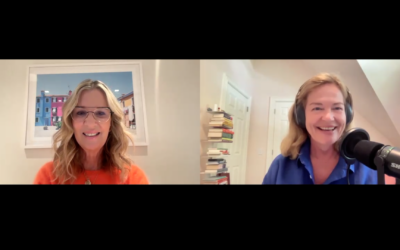
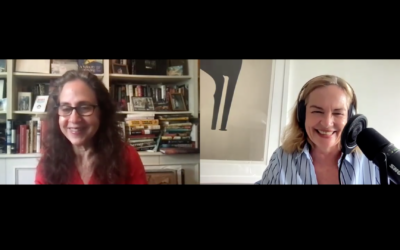
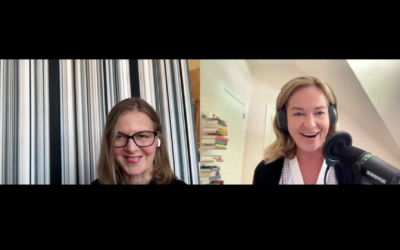
0 Comments